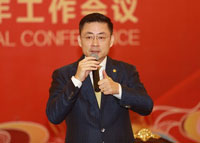In its rise to become one of China’s biggest firms, HNA Group acted more like a risky hedge fund or private equity group than a traditional conglomerate looking for long term investments, according to the Wall Street Journal. And that strategy has led to heightened scrutiny from regulators and Wall Street as the company’s expansion grinds to a halt.
HNA Group CEO Adam Tan has been flying around the world to convince leaders and companies to keep working with HNA, sources told the Journal, though the company denies that banks have stopped working with the firm.
Some credit-rating agencies have expressed concerns about HNA’s impact on companies it has acquired, and there’s a fear that pull-back from conglomerates like HNA could have a broader impact on markets.
“There is the risk of financial damage, but also public embarrassment if there is a big Chinese company that could go bankrupt,” Thilo Hanemann, a director at the New York consultancy Rhodium Group, told the Journal. There’s also the “contagion risk,” he added, of troubles at Chinese companies having global ripple effects.
There are no signs that HNA’s business is in immediate danger. Revenues during the first half of the year were 272 billion yuan, an increase of 92 percent from the previous six months, according to the Journal. But net income fell about 10 percent to 812.5 billion yuan during the same time, and HNA has more than $100 billion in total debt.
And HNA’s followed a risky strategy. Instead of targeting profitable companies, the company went after assets with impressive revenues that would see its rank rise among Fortune 500 companies, and looked to acquire firms whose assets it could use as collateral to back more purchases, people familiar with the company’s strategy said.
The strategy is risky because if the value of an asset drops, the investments and loans backed by it can fall into jeopardy.
In its $6.5 billion deal to buy a 25 percent stake in Hilton Worldwide Holdings, HNA used margin loans – borrowing against stockholdings, sometimes in a target company – to make up $3 billion of the cost, the Journal reported. If the value of Hilton were to fall, banks could require HNA to come up with additional funds quickly.
HNA spent $2.21 billion to acquire office tower 245 Park Avenue, paying over $1,200 a square foot. [WSJ] – Rich Bockmann
